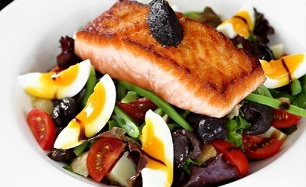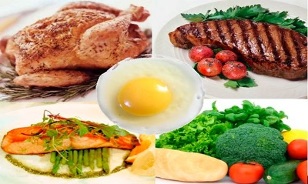How many times have you had to re-read many very effective diets that help a person get rid of subcutaneous fat? Do you know why there are more than 10, 000 options for different activities to lose weight in the world? It's simple: because 90% of them are ineffective. A protein diet for weight loss is a good choice, but it can also be ineffective if used incorrectly. How to use proteins for weight loss without harm to health with maximum results?
How to lose weight on a protein diet?
To get rid of subcutaneous fat, you need to know the normal needs of the body, understand when to eat carbohydrates and when to eat protein and be able to listen to your body, which gives an unlimited number of prompts, in casewe are doing the wrong diet.
Surely most of you already know that if you limit your intake of sweet and complex carbohydrates, you are likely to achieve significant weight loss, this percentage depends on the percentage of fat in the human body. This can be called a low carb diet, which is a very effective way to get rid of fat. The calorie deficit created by minimizing carbohydrate intake is completely supplemented with fat. This is why people lose weight by limiting the use of carbohydrates in their diet.
What if we eliminate carbohydrates completely from the diet?
Will we have a better way to lose weight? Our answer: of course, yes. This diet was especially popular during the golden age of bodybuilding and was widely promoted by Vince Gironde. You just have to look at his photo and it will be immediately clear why he recommended it. Named one of the best, according to many nutritionists, methods of effective fat burning is a protein diet.

The protein weight loss diet is a carbohydrate-free diet consisting only of protein foods and healthy fats for the body. Carbohydrate calories are completely offset by animal protein. This approach not only allows you to get rid of fat as efficiently as possible, but also speeds up metabolism and maintains muscle tissue as much as possible.
Many diets do not take into account the last two aspects: their main goal is simply to reduce the total daily calorie intake, which does not have a very positive effect on the condition of a person who loses weight.
A sharp reduction in calorie intake is considered by the body as a threat to life, it begins to slow down the metabolism and transfer all the food consumed to subcutaneous fat, using muscle fibers for energy consumption. So it turns out that at the end of this method of weight loss, a person creates ideal conditions for increasing fat and does everything to burn muscle mass. Hopefully now you have lost the desire to try the famous monophonic diets?
Basic principles of protein diet
When we create an environment in which carbohydrates are completely absent, ketone bodies begin to be released from subcutaneous fat, which is the main source of energy supply for the brain and nervous system.
To make it clearer, it is necessary to explain that all the foods we eat contain more or less three nutrients and each of them performs its own function to support the life of the body. These are fats, proteins and carbohydrates:
- Proteinis a building block for our body, as energy is used in extremely rare cases.
- Fatis the stored energy stored for emergencies and fat is also used to protect internal organs.
- Carbohydratesare fully responsible for providing energy to our body.
Now it is clearer why we want to eat sugary or complex carbohydrates when we are hungry? Because carbohydrates are the main source of energy for our body, both proteins and fats remain in stock. Therefore, in everyday life, you want to eat just the sweet and complex carbohydrates: this is the most effective way to provide energy to the body. And that's why people do not like to exclude foods that contain carbohydrates from their diet. The body does not understand that a person is deliberately excluding the main source of energy. Your body believes that you are in harsh living conditions and hunger is expected. If carbohydrates do not start flowing as soon as possible, the body will be forced to unpack urgent fat stores.
What happens if you continue to limit your carbohydrate intake?
First, your body will deplete all its glycogen stores, which will last for a short time and only after that will it completely change to an autonomous diet of proteins and fats. The protein diet has received a lot of positive reviews from people who have achieved incredible results thanks to this method of weight loss. To be honest with you, everyone in the diet world has the foundation of the protein weight loss method. Carefully read any mono-diet and between the lines you will see the basics we cover in our article. Of course, if the author of the diet, which you are going to read, presented it correctly.
It is important to add the important point that leaving about 50 grams of carbohydrates in a rigid protein diet will not cause an increase in a person's blood glucose. This means that the body will continue to feed on adipose tissue to ensure a positive energy balance in the body.
Should You Eliminate Carbohydrate Intake In A Protein Diet?
This conclusion has many advantages and a small minus. On the plus side, it eliminates unhealthy carbohydrates from your diet and eliminates glycogen stores. This causes the body to start using up fat stores as soon as possible. And the reason for everything is our old friend's insulin. Its presence or absence determines the type of energy that the body will expend. Everything is simple here: the less carbs you eat, the less insulin you secrete. An increase in this hormone completely blocks the lipolysis process (breakdown of adipose tissue). It can be concluded that a protein diet eliminates the increase in insulin and activates the full effect of lipolysis.
What is the main disadvantage of a dietary protein?
In order to maintain the proper functioning of the digestive system, it is necessary at least occasionally to consume fiber, where are they located? That's right, on carbs. Failure to do so can lead to problems such as constipation, which is completely unpleasant news. Therefore, we strongly recommend that you do not exclude vegetables such as cucumbers, tomatoes and cabbage from your protein diet. They will keep your gastrointestinal system fully functional.
Damage to a diet protein
Damage to a protein diet can only occur if you start consuming excessive amounts of protein and eliminate fiber from your diet altogether. And all these actions will be applied for a long time, then dysfunctions will begin in the body. We strongly recommend that you consult your doctor and dietitian before using the above regimen. Because there is an important list of diseases in which the use of only protein foods is unacceptable. Good health to all and finally become the owners of the most charming figure in your city.How long does a protein diet last?

- There is an option for a continuous diet: for a long time you consume only protein, healthy fats and fiber.
- Power Nutritionis only used on training days. Do a load of carbs about two hours before your workout to provide glycogen and significantly increase the intensity of your exercise. The rest of the days a protein diet.
- Cyclic use of protein diet. This option provides a carb load once a week all day. This will help maintain muscle mass to the maximum and further boost metabolism. This is the way we suggest to use all those who want to make the body worthy of its spirit. Although you can experiment and choose the most suitable option for yourself.
What to eat with a protein diet: food
Probably, the answer will not surprise you if we say that these must be foods that contain animal protein. It is best to use lean meats such as beef, veal, chicken breasts and rabbit. From dairy products, choose foods that do not contain a lot of fat, but you should not eat only low-fat kefir. A fat content of up to 10% is quite suitable. This is normal, you do not need to worry. "Remember, fats are burned in the fire of carbohydrates. " Be sure to eat fish: it is not only high in protein, but also a source of healthy omega fats. Do not forget the eggs as a reference point for the assimilation of all the above products.
There should be 5 to 10 meals a day, in fact, the more the better. That's why all foods should be prepared in the morning and evenly distributed in the bowls: this makes it possible to open a container with food at any time of the day and consume the required amount of food.
Sample menu for the week
This can be the 7 day protein diet menu or it can be extended by 14 days.
Monday
- non-fat cottage cheese packaging.
- jar of yogurt, 1 grapefruit
- 2 chicken breasts, broccoli, half a glass of kefir?
- a jar of yogurt, grated medium carrots.
- 1 liter of mineral water, a glass of natural apple juice.
Tuesday
- yogurt, green apple?
- 100 g meat, cheese, tomato, 1 pepper.
- 200 g fish, celery salad, carrots and apple;
- 2 boiled eggs, cabbage salad with parsley and lemon juice.
- 1 liter of water, 1 glass of raisin juice.
Wednesday
- yogurt, a glass of strawberries?
- granular cottage cheese with the addition of a tablespoon of chopped parsley, red pepper and tomato paste.
- 2 chicken breasts, a cup of spinach, half a cup of kefir?
- any stew, zucchini, 1 tomato, 2 tablespoons dill (you can mix vegetables and add 2 tablespoons olive oil), 2 slices of ham.
- 1 liter of water, a glass of orange juice.
Thursday
- non-fat cottage cheese packaging.
- a glass of kefir, ½ a glass of raspberries?
- 200 grams of stew, 1/3 cup milk, carrots
- 2 eggs, cabbage salad with paprika and parsley, spices with lemon juice.
- 1 liter. water, a glass of raisin juice.
Friday
- yogurt, 2 tangerines;
- granular curd (1 pack);
- 200 grams of seafood, tomato, red pepper and parsley salad, yogurt?
- granular cottage cheese (1 pack), carrots, green apple;
- 1 liter of water, a glass of orange juice.
Saturday
- 100 grams of cottage cheese, skim milk?
- a glass of kefir?
- 2 chicken breasts, beans, yogurt?
- 2 slices of ham, broccoli, 1 egg, 2 tablespoons corn
- 1 liter. water, a glass of raisin juice.
Sunday
- a glass of kefir, or a cup of raspberries (or other berries).
- granular curd, ham slice?
- boiled chicken liver, lettuce with lemon juice, apple?
- yogurt with added fruit.
- 1 liter of water, a glass of apple juice.














































































